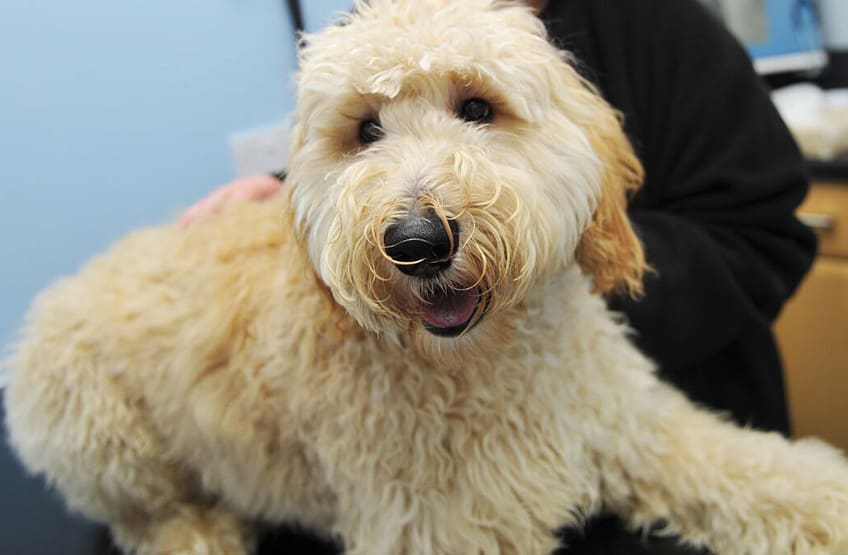It’s not their fault, so the most important advice we can offer is to never scold your senior dog for having an accident.
This will inevitably result in stress and confusion, which can often make the problem even worse. So what should you do instead if your senior dog develops an incontinence problem?
Senior Dog Incontinence – The Essential Facts
Though senior dogs of both sexes can suffer from incontinence, the issue is far more common in female dogs. This is because, as female dogs age, their control of the neck of their bladder can deteriorate. Urine can all too easily leak out when the exit of the bladder is not fully closed.
This condition is known as “sphincter mechanism incontinence”, and it’s thought to be the cause of around 80% of incontinence cases. y get a little senile, it’s also possible for elderly dogs to forget their house training. This might result in their leaving a wet patch where they lie. Again, this is completely involuntary, and punishing your dog for such wet patches will not help anyone.
Other causes of incontinence include fluctuating hormone levels, spinal and neurological problems, infections, illnesses, and extreme stress and anxiety.
If you are worried about your dog please get in touch with your local Calder Vets practice in West Yorkshire to book an appointment for a check-up.
The Tell-Tale Signs of Senior Dog Incontinence
Wet patches on the bedding is one of many signs to look out for. Any of the following may indicate that your dog is developing a problem;
- Damp legs – particularly if your dog is a long haired breed
- A persistent smell of urine, either on your dog or round their bedding
- Scalding on the skin, from where your dog’s been in constant contact with urine
- An increased tendency to lick around the back end
Incontinence problems might come and go for a while before they develop into a chronic problem. The problem can become a lot more pronounced if there’s an additional medical condition affecting the urinary tract. But one thing to bear in mind is that incontinent dogs experience no discomfort, so don’t expect them to display any signs of pain while urinating. Similarly, incontinent dogs will continue to urinate normally during walkies and when let out into the garden.
Noticing any of these signs with your dog?
Get in touch with Calder Vets in West yorkshire today!
Medical Treatments for Incontinent Dogs
Certain medical procedures can help dogs suffering from incontinence. And the good news is that, in the vast majority of cases, these treatments are 100% successful. So if you’re concerned that your ageing dog is developing an incontinence problem, talk to your vet.
They’ll perform a full health check, and they may collect and test a urine sample. This will help them to identify whether any underlying conditions are aggravating the problem, such as a urinary tract infection. Once they’ve ruled out infections, kidney disease, diabetes, and the sort of illnesses that encourage excessive water consumption, they’ll know precisely which course of action to take. When treating any dog for incontinence, it’s vital that the correct underlying cause is addressed.
Dogs suffering from a hormonal imbalance will need a different cause of treatment to a dog suffering from an infection or illness. That’s why it’s important to get in touch with us from the moment you spot the problem. Unless there’s an underlying problem, and if the incontinence isn’t especially pronounced, many vets will choose to treat the issue with medication or hormone supplements.
Surgical Procedures to Treat Incontinence
Certain cases may only be treated by surgical procedures. Several different treatments might be required to treat the whole problem, but most procedures revolve around strengthening the bladder neck muscles.
This can be achieved either through implanting a “urethral occluder”, through injecting collagen around the sphincter muscles, or through “tacking” the bladder into a more functional position. But not all treatments offer a permanent fix, which is why most vets will only ever resort to surgery after having explored every other possible course of treatment.
Other Ways to Help Your Incontinent Dog
Treatment can take a while, and there’s never an absolute guarantee that the problem will go away completely. As a result, many dog owners treat incontinence as “just one of those things” – an ongoing problem that they’ll just have to deal with from time to time.
There’s a range of products out there specifically designed to make life easier for incontinent dogs and their owners. For example, absorbent bedding. It’s more hygienic, easier to clean, and because it pulls the urine away from your dog’s skin, it’ll cause them less discomfort. You can even buy incontinence pads for dogs. Certain behavioural changes will also make a difference.
Make a point of washing and drying your dog’s back legs every morning to remove all traces of urine and discomfort. And give your dog plenty of opportunities to empty their bladder – take them outside as often as possible.
However, and this is very important, never try to treat your dog’s incontinence by reducing their water intake! Unless there’s an underlying medical issue, it’s highly unlikely that your dog’s incontinence is caused by excessive drinking. They’ll always need plenty of water to drink, so taking away their supply can result in dehydration and a range of serious health issues which could cause them to become very ill.
For more information about treating your senior dog’s incontinence, feel free to get in touch.
Call our Dewsbury Hospital on 01924 465 592 or contact your local Calder Vets branch.



Our Services